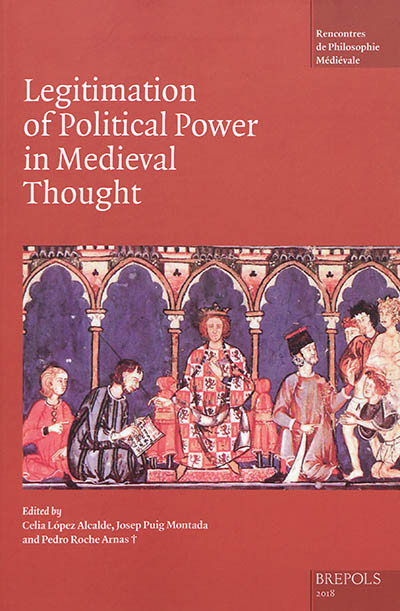en savoir plus

Carte fidélité
Permet à tous ses détenteurs d'obtenir 5% de réduction sur tous les livres lors du retrait en magasin (réduction non cumulable avec les réductions de type étudiant).
Offre également un certain nombre d'avantages auprès de nos partenaires.
Wishlist
Avec les favoris, retrouvez dans un espace les sélections effectuées au fur et à mesure de vos navigations dans le site.
Constituez pour votre usage personnel vos listes de livres en prévisions d'achats futurs et votre sélection d'articles, dossiers, événements, vidéos ou podcasts préférés ou à découvrir plus tard...
Il suffit simplement de cliquer sur "Ajout Favori" sur chaque page qui vous intéresse pour les retrouver ensuite dans votre espace personnel.
Requiert un compte Mollat
Mes Alertes
Requiert un compte Mollat
Legitimation of political power in Medieval thought : acts of the XIX Annual Colloquium of the Société internationale pour l'étude de la philosophie médiévale, Alcala, 18th-20th september 2013
Auteur : Société internationale pour l'étude de la philosophie médiévale. International colloquium (19 ; 2013 ; Alcala, Espagne)
en savoir plus
Résumé
Communications sur les fondements de la légitimité du pouvoir au Moyen Age dans la tradition juive, chrétienne ou musulmane. Les points de vue, souvent opposés, de grands penseurs comme Thomas d'Aquin, Gilles de Rome, Dante, Moïse Maimonide ou Al-Farabi sont notamment étudiés. ©Electre 2025
Lire la Quatrième de couverture
Réduire la Quatrième de couverture
What makes political power legitimate ? Without legitimation, subjects will not accept power, and, since religion permeated medieval society, religion became foundational to philosophical legitimations of political power.
In 2013, the XIX Annual Colloquium of the International Society for the Study of Medieval Philosophy took place in Alcalá de Henares, one of the medieval centers of political debate within and between Jewish, Christian and Muslim communities. The members of these communities all shared the common belief that God constitutes the remote or proximate cause of legitimation. Yet, beyond this common belief, they differed significantly in their points of departure and how their arguments evolved. For instance, the debate among Western Christians in the conflict between secular power and Papal authority sowed the seeds for a secular basis oflegitimacy.
The volume reflects the results ofthe colloquium. Many contributions focus on key Christian thinkers such as Marsilius of Padua, Thomas Aquinas, John Quidort of Paris, Giles of Rome, Dante, and William of Ockham; other studies focus on major authors from the Jewish and Muslim traditions, such as Maimonides and Alfarabi. Finally, several papers focus on lesser-known but no less important figures for the history of political thought : Manegold of Lautenbach, Ptolemy ofLucca, Guido Terrena, John of Viterbo, Pierre de Ceffons, John Wyclifand Pierre de Plaoul. The contributions rely on original texts, giving the readers a fresh insight into these issues.
Fiche Technique
Paru le : 01/05/2018
Thématique : Textes des Philosophes
Auteur(s) : Auteur : Société internationale pour l'étude de la philosophie médiévale. International colloquium (19 ; 2013 ; Alcala, Espagne)
Éditeur(s) :
Brepols
Collection(s) : Rencontres de philosophie médiévale
Contributeur(s) : Editeur scientifique (ou intellectuel) : Celia López Alcalde - Editeur scientifique (ou intellectuel) : Josep Puig Montada - Editeur scientifique (ou intellectuel) : Pedro Roche Arnas
Série(s) : Non précisé.
ISBN : 978-2-503-58018-0
EAN13 : 9782503580180
Reliure : Broché
Pages : XII-456
Hauteur: 24.0 cm / Largeur 16.0 cm
Épaisseur: 2.9 cm
Poids: 0 g
